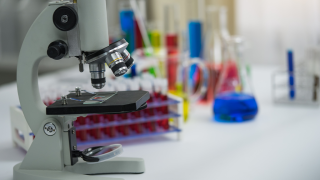
Contact your Representative to support the HEARTS Act
The U.S. National Institutes of Health has created a working group to develop non-animal testing methods, in direct response to a request we advocated for in the 2022 Labor, Health and Human Services Appropriations bill.
We pushed for language inspired by the HEARTS (Humane and Existing Alternatives in Research Sciences) Act to be included in the 2022 bill, tasking the NIH to assemble a Humane Research Alternatives Panel. The report that accompanied the final bill, signed by President Biden, read:
“Humane Research Alternatives Panel – Humane Research Alternatives.-Recognizing that humane, cost-effective, and scientifically suitable non-animal methods are available for certain research models, the agreement directs NIH to appoint a working group to make recommendations for encouraging the use of non-animal models where appropriate in NIH intramural and extramural research, including epidemiological and clinical studies, cell-based methods, computer modeling and simulation, and human tissue studies, with consideration for complexity of the biomedical research area, and the current applicability and translatability of the non-animal model. The panel should also report on effectively moving research away from methods that rely on poorly defined animal models to methods that rely on validated non-animal alternatives.
“The working group should review and recommend means of encouraging greater reliance on validated human-relevant non-animal methods/approaches that are appropriate for identified research areas. Membership should include individuals with proven knowledge of/experience with non-animal research methods; with proven knowledge of/expertise with animal research models; with expertise in evaluating the adequacy of justifications described in research applications and proposals for why the research goals cannot be accomplished using an alternative model; and with knowledge of research animal welfare, and relevant scientific limitations. The Committee asks that NIH provide a report of the working group's findings within 180 days of enactment of this Act.”
In relation to this working group, the Advisory Council to the Director Working Group on Catalyzing the Development and Use of Novel Alternative Methods to Advance Biomedical Research, the NIH said, “NIH investment in alternative methods, including in chemico, in vitro, and in silico approaches, has increased dramatically over the past 15 years. They have proven beneficial tools across basic and clinical research studies, being developed and applied to interrogate cancer, diabetes, cardiovascular disease, Alzheimer's disease, infectious disease, rare diseases, and more.” The NIH also noted that, “The development of these NAMs holds tremendous promise for increasing the tools available to achieve the NIH mission and potentially reduce and refine the future use of animals in some areas of research in the future.”
We look forward to reviewing the results of this advisory council and working group, and fervently hope that it boosts the use and development of modern non-animal research methods which can improve the cost efficacy of our federal research investment and foster innovation in science, lead to better therapies for human conditions, and spare animals.
The U.S. federal legislative process can be frustratingly slow, with many bills failing to advance through the legislative process even after decades of work. However, this proves that passing the bill is not the only way to advance the goals contained within it.
The formation of this panel and workgroup is a tremendous step toward achieving the goal of the HEARTS Act, and it is still important to continue to build support for the bill. U.S. residents can help advance the HEARTS Act by contacting their U.S. Representative and asking that they become a cosponsor of the bill below.
